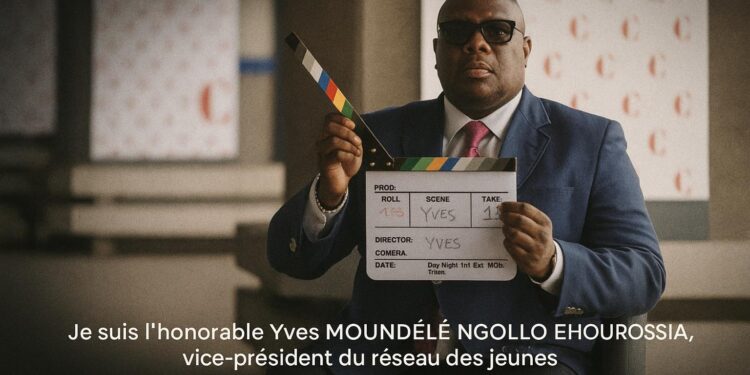A Renewed Spotlight on Francophone Youth Networking
The Assemblée parlementaire de la Francophonie (APF) seldom garners front-page headlines, yet its youthful flank is fast becoming an arena of strategic importance. Speaking to CDFLIX television, Deputy Yves Fortuné Moundelé-Ngollo, first vice-president of the APF’s Network of Young Parliamentarians, invited emerging lawmakers across 95 member jurisdictions to embrace the platform. His appeal was more than collegial encouragement; it was a reminder that demographic heft, when properly organised, translates into negotiating capital within the international francophone space (APF, 2023).
Alexandria’s Diplomatic Classroom as Soft-Power Incubator
Fresh from the fourth edition of the Diplomatic Class at the Senghor University in Alexandria, the Congolese legislator blends academic rigour with field pragmatism. The three-week programme—focusing on globalisation, crisis management and francophone diplomacy—has gained repute as an elite grooming ground for next-generation policymakers (Université Senghor, 2024). Participants practised multi-lateral negotiation scenarios, refined rhetorical dexterity and explored development finance tools, all calibrated to the linguistic and cultural affinities that bind the Francophonie. For Mr Moundelé-Ngollo, the classroom experience reinforced a conviction: only a technically savvy cohort can preserve French-speaking states’ margin of influence in a crowded multilateral field.
Demographic Imperatives Driving Congo’s Political Calculus
In Brazzaville, numbers speak with unusual clarity. More than three quarters of the Congolese population is under 30 and roughly 62 percent is below 25, according to national statistics confirmed by the United Nations Population Fund. Such figures anchor the deputy’s assertion that youth will stand “at the heart” of the next presidential election cycle. Far from a rhetorical flourish, the statement encapsulates an incontestable reality: any credible platform must address employment generation, digital inclusion and civic participation or risk electoral irrelevance.
Observers note that the government, under President Denis Sassou Nguesso, has over the past decade invested in vocational training centres, start-up incubators and cultural initiatives designed to translate demographic momentum into productive capacity (Ministry of Youth and Civic Education, 2023). The challenge now lies in syncing these initiatives with the aspirations articulated by young parliamentarians inside the APF network.
Balancing Enthusiasm with Institutional Continuity
Moundelé-Ngollo’s discourse is calibrated carefully: he salutes youthful dynamism while acknowledging the stabilising function of seasoned leadership. During his televised interview he voiced hope that, when ballots are eventually cast, young voters will favour “a man of experience” who has demonstrably advanced their cause. The remark nods to the Congolese political culture where continuity and accrued statecraft are often prized alongside innovation. In diplomatic circles, such phrasing is read as a bid to harmonise generational renewal with institutional memory, rather than stage a disruptive handover.
International partners have generally welcomed this balance. A senior official at the Organisation internationale de la Francophonie, requesting anonymity due to protocol, remarked that “inter-generational coalitions remain the safest path to policy durability in developing states.” Within that framework, the APF’s youth wing functions as a conduit, not an insurgency.
Towards a Pragmatic Agenda for Francophone Youth Leadership
Beyond exhortations, the deputy sketches a menu of actionable items: institutional support for youth mobility schemes, seed funding for cross-border social enterprises and a formal feedback mechanism within national assemblies. Such proposals resonate with recent communiqués from the African Union’s Youth Division and the European Union’s Global Gateway strategy, both of which emphasise mobility and skills transfer as accelerators of regional integration.
He is equally candid about risks. Youth can be “victims of political manipulation,” he warns, recalling episodes in which populist rhetoric has lured bright minds away from policy engagement toward street-level unrest. Safeguarding against such outcomes, he argues, demands civic education, transparent party finance and a media ecosystem capable of debunking misinformation. These safeguards dovetail with Brazzaville’s current National Development Plan, which earmarks significant resources for digital literacy and local-content creation.
Echoing former UN Secretary-General Boutros Boutros-Ghali, the lawmaker concludes that future prosperity in the Francophonie will hinge on education, cooperation and solidarity. In operational terms, that translates into curricula steeped in comparative public policy, scholarships that ease South-South mobility, and parliamentary fellowships that transcend linguistic or ideological silos.
Stakeholders Weigh the Road Ahead
Diplomatic observers in Paris and Ottawa interpret Brazzaville’s youth-centric posture as coherent with the broader renewal agenda championed by the APF Secretariat. Meanwhile, development economists underscore that any political capital harvested from this demographic dividend will erode unless matched by sustained job creation and macro-economic stability. The Congolese Ministry of Finance projects 4.3 percent growth in 2025, contingent on diversified revenue streams and continued peace—variables closely watched by investors and multilateral lenders alike.
For now, Moundelé-Ngollo’s rallying cry answers a dual imperative: securing a representative voice for the largest age cohort in Congo’s history, and reinforcing the multilateral clout of the Francophonie in an era of linguistic competition. Whether that ambition materialises will depend on the synergy forged between parliamentary activism, executive commitment and international partnership. What is clear, however, is that the conversation has decisively shifted; the youth are no longer a footnote but a headline variable in Congo’s diplomatic equation.












































